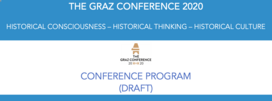VIII – Ethical aspects interrelated to the core concepts (human dignity, sustainability, social responsibility
The idea of ‘learning from the past’ might be regarded differently in the various regions of the world. Conclusions and/or assumptions which might be common sense in one group of countries might cause rejection and misunderstanding in the other group. - When discussing scientific concepts in an international perspective, what might be common political ground in one group (such as Human rights, rule of law, democracy …) might be easily misunderstood as political/ideological weapon by members of other communities when applying them in the international relations.
Most core concepts in history didactics/historical education integrate, what is called the ethical (moral) dimension as a basic factor/assumption of their theoretical reflection. In writing, negotiating or staging historical narratives, authors not only make factual judgements but come to explicit or implicit value judgements about past situations and developments. However, the hermeneutic approach and the epistemic understanding of factual and value judgements may be regarded differently in the various communities (e.g. focus on historical empathy vs. contemporary ethical standards).
The idea of ‘Human Dignity’ seems to build a common metaphor for all ethical assumptions and reflections on human conditions and human development. Although, not only with regard to the traumatic experiences of the Shoa and other forms of genocide, but also with regard to the ongoing excessive exercise a/o misuse of (state) power towards refugees, disdain towards black lives, the repression of gender diversity, ignorance of social inequality, as well as all kind of cultural and religious intolerance, this principle is challenged in many ways and requests refreshment and strengthening also from the side of citizenship education and historical learning.
Narratives on natural catastrophes, great diseases, pandemics and/or contamination of living conditions can be found in historiography back to the Middle Ages, colonial times or even Antiquity. The reactions of human beings towards such unexpected catastrophes were manifold, the explanations frequently irrational. Reactions such as fear, panic, projective defense, megalomania, paranoia, identification of scapegoats etc. resurge dramatically and become open for scientific observation and debate not only as idiosyncratic phenomena but also as collective reverberations. However, the global political governance of climate change, pollution, pandemics, the involvement of scientific expertise in the explanation of complex transnational challenges, the debate of and the search for intercultural and global solutions for these challenges, or the development of strategies and mechanism of global social responsibility, seem to be relatively new and requests innovative approaches to historical investigation, description, interpretation and reflection.
In addition, connected to the significant challenges of creating a theoretical basis for working with historical narratives in a sustainable global environment; for establishing a democratic culture of historical debate and reflection in the multicultural society; and for creating a sound theoretical framework for constructing, negotiating and questioning historical narratives in the digital age, the generation of scholars, who are (or will be) responsible for further developing the theoretical and methodological framework in history didactics/historical education today, is confronted with a number of additional expectations.
To be viable in the intercultural scientific debate, the ethical dimensions of the core concepts and their terminology therefore demand sound comparison, analytic debate and clarification.
Questions to be considered:
- How to develop historical sense-making and identity-building in an intercultural perspective?
- How to develop the core concepts in an intercultural dimension without falling into the traps of national, religious or ideological bias, stereotypes or by relaying on the multiple forms of hegemonial discourses and cultural wars?
- How to contribute best to an adequate methodology for research, description and understanding of the complexity of sustainable historical processes?
- How to contribute to adequate theoretical reflection on mental processes (identity building and self-reflection) of the historically thinking and responsible global citizen?
- How to develop the intercultural discourse on human dignity without using ascientistic, antiscientistic and/or relativistic concepts of ‘historical thinking’?
- How to contribute to memory culture a/o to a ‘historical culture of reconciliation’ with respect to the global dimension of ethical reflection?
- How can we contribute to a sustainable historical education with respect of Human dignity?
- What are adequate didactic approaches to enhance global social responsibility when working on narratives such as pandemics, climate change or racism?
- How can citizenship education serve as a form of prevention of misuse of power and as a bridge to human dignity and social equality?
Conference Office
Alois Ecker
Institute of History
Heinrichstraße 26/II
8010 Graz
Institute of History
Heinrichstraße 26/II
8010 Graz
Benjamin Ecker
Institute of History
Heinrichstraße 26/II
8010 Graz
CONFERENCE OFFICE
grazconference2020(at)uni-graz.at
+43 699 19221739
Bettina Paireder
Alois Ecker
Benjamin Ecker



